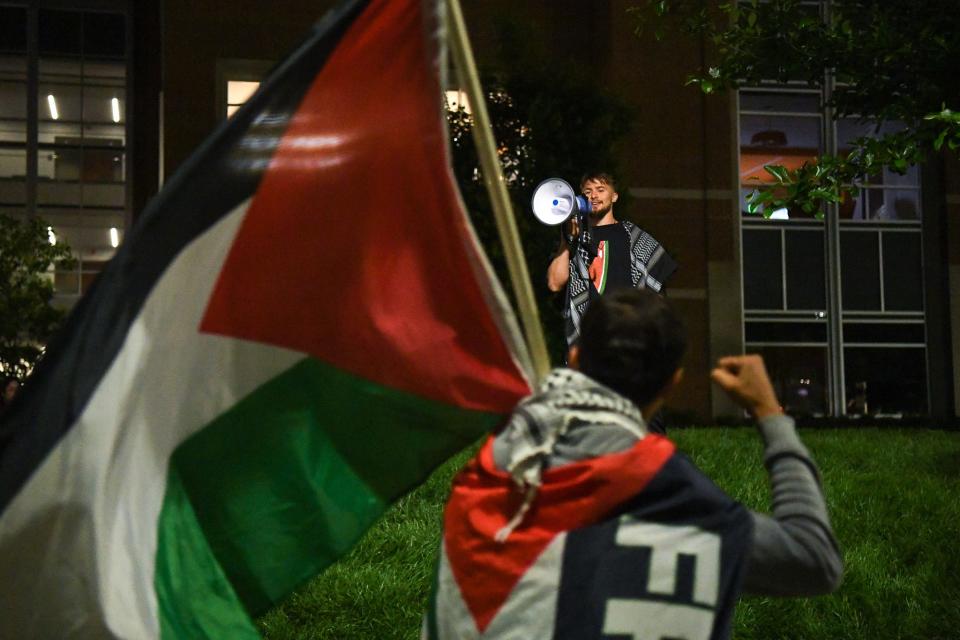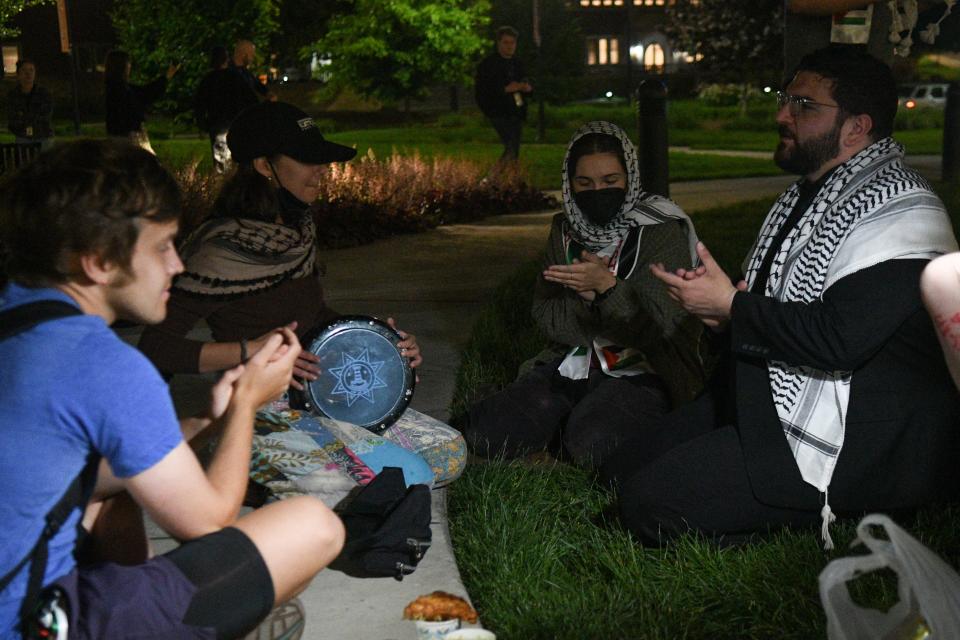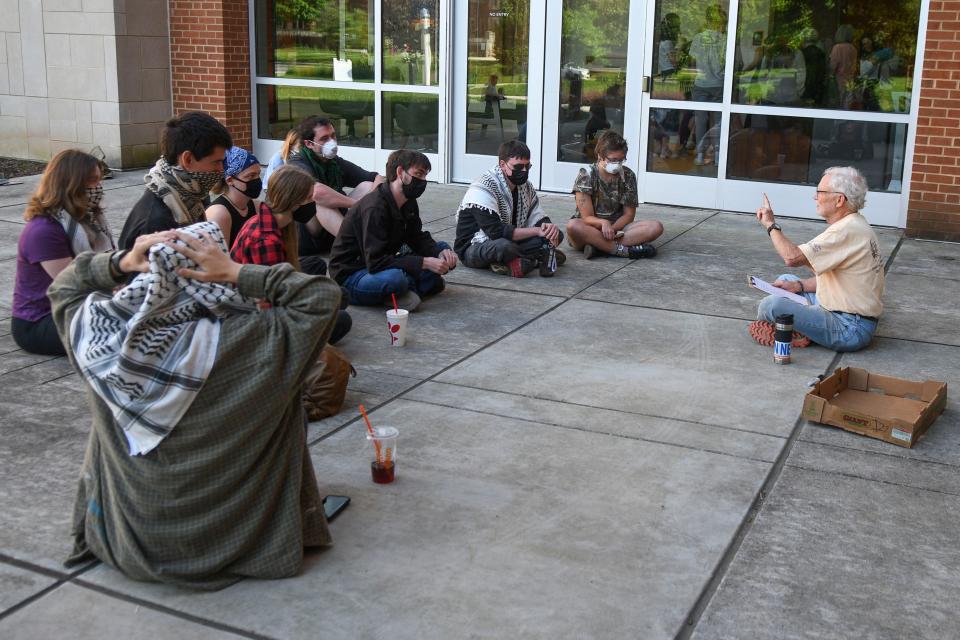Tennessee student policies do not threaten free speech, First Amendment experts say
Pro-Palestine demonstrators have asserted Tennessee's anti-camping law and the University of Tennessee at Knoxville's parallel restrictions on when, where and how they can protest on campus infringe on their rights, but First Amendment experts say these limits almost always stand up in court.
"Time, place and manner restrictions are always held up when they make sense and don't target any specific speech," said Ken Paulson, director of the Free Speech Center at Middle Tennessee State University.
When it comes to restricting free speech, making sense means providing ample opportunities for expression.
The university reserved the Student Union lawn for the group that calls itself the People's School for Gaza from 7 a.m.-10 p.m. to align with the building's hours of operation during the regular school year, and kept those hours consistent after the facility switched May 15 to its summer hours of 7 a.m.-6 p.m.
The hours set by the university align with those of Tennessee's ban on camping on state land, which legislators elevated to a felony following the protests that erupted nationwide after a Minneapolis police officer killed George Floyd in 2020.
Though students and community members are not allowed to demonstrate on the lawn past 10 p.m. – per the guidelines the university set in place May 7 – they are welcome to move to the city-owned sidewalk, so long as they don't shout so loudly that students trying to study nearby cannot focus.
That's another part of drafting reasonable free speech limits: Speech should not disrupt the normal functions of the university.
As Paulson likes to say, you can stand on a street corner in Knoxville and say almost anything you please. You can even raise your voice. But if you get a speaker and a microphone, you could be legally stopped from disrupting city operations. (Demonstrators at the university have not relied on amplification.)
David French: Tennessee's camping law is 'reasonable'
UT is balancing its obligations to maintain control of its facilities and grounds, allow First Amendment-protected speech, and create rules that will be applied to future demonstrators - and the messages they champion - that are content neutral.
Universities around the country have successfully placed limits on free speech to fulfill these obligations. The First Amendment, in turn, places restrictions on what universities can do to limit free speech, said David French, a First Amendment lawyer and columnist for The New York Times whose children attended UT.
The state or university could not, for instance, flip the timeframe for the camping ban. A policy against gathering between 7 a.m. and 10 p.m. would allow demonstrations to effectively reach the public.
Limitations on campus free speech must not violate other students' rights, either.
"A rule against overnight camping is a reasonable time, place and manner restriction − or a rule that says that if I have the quad for one day, another group gets to have it the next day," said French, who lives in Tennessee. "In essence, you're taking turns in your access."

UT must comply with state and federal law but can create its own free speech policies as long as those policies do not contradict law.
Administrators have implored demonstrators to register as a student organization. This would allow them to reserve campus spaces on their own under university policy. UT has offered demonstrators an expedited process, but the group has not registered.
What free speech limits are not allowed at Tennessee?
There are generally three tests of whether a time, place and manner restriction can withstand a legal challenge under the First Amendment, as laid out in the 1989 Supreme Court case Ward v. Rock Against Racism.
Time, place and manner restrictions must be "content neutral, narrowly tailored to serve a significant governmental interest, and allow for ample alternative channels for communicating a speaker’s message," according to the National Constitution Center.
One set of campus free speech restrictions that have not passed constitutional muster in many court challenges are so-called "free speech zones," small spaces on large campuses where students could speak without limitation.
As a litigator and former president of the Foundation for Individual Rights and Expression, French led lawsuits against campuses that tried to create free speech zones.

"If you restrict speech activities to small parts of big campuses, you're going to be getting real legal trouble," French said.
UT 'study sessions' a stark contrast to other demonstrations
One striking aspect of the demonstrators at UT is how closely they have followed the university's time, place and manner restrictions. This is in stark contrast to raucous protests that have happened on other campuses across the country.
Demonstrations at UT share little resemblance with the prolonged encampments – and in some cases occupations – of campus spaces at schools such as Columbia University, UCLA and the University of Chicago.
Unlike campus protests over the Vietnam War, the pro-Palestinian protests are quite limited in scale, Paulson said. He estimates that substantial demonstrations have occurred at only 2% of U.S. campuses.
While a few other universities have experienced disruptive protests around the clock, including some broken up by police, demonstrators at UT have been holding what they call "spontaneous study sessions." These have occurred almost daily since seven students and two community members were arrested before 10 p.m. May 2 and released. The students were referred to the university on school code violations and the two community members were given trespassing citations.
If not for demonstrators' signs and Palestinian flags, someone driving by the Student Union on Cumberland Avenue might mistake the group for any outdoor study session happening ahead of exams.
But their sense of calm contrasts with the powerful feelings they share about Israel's massive ongoing offensive against the Gaza Strip after Hamas attackers broke out of the blockaded Palestinian territory Oct. 7 and killed more than 1,100 people, most of them Israeli civilians, and took hostage about 250 civilians and soldiers.
Seven months later, Israel's military actions have killed more than 34,500 Palestinians, the Gaza Health Ministry told Reuters on April 30. Palestinian health officials say two-thirds of those killed were women and children.

Student demonstrators say UT has supported Israel through financial ties, which they want disclosed and terminated. In a letter to student activists, UT said it has no direct investments in companies in Israel. The UT System invests donations globally through third-party funds and it estimates 0.2% of the portfolio is invested in Israel-based companies.
Gatherings can't interfere with UT's 'educational mission'
The peacefulness of the demonstrators at UT have shielded them from one of the university's central limitations, which places restrictions on free speech and assembly to "maintain an atmosphere on the campus conducive to academic work" and to "preserve the dignity and seriousness of university ceremonies and public exercises."
Demonstrations cannot be violent, obstruct vehicle or pedestrian traffic or interfere with classes or ceremonies. Well-known court tests to unlawful speech, such as "fighting words" or speech directed at inciting "imminent lawless action," also are at play on campus.
"The primary purpose of the campus is still educational, so the protests cannot interfere with the educational mission of the university," French said. "That can include loud protests that keep students up at night."
On some nights since May 7, the loudest sound coming from the student lawn has been a message broadcast from a public safety kiosk (those blue-light poles around campus) every night at 9:45 p.m. and 10 p.m. telling demonstrators it is time to go.
Many were shocked to learn the kiosk could broadcast. For some, the broadcast was the first time they learned of their lawn reservation, which UT outlined on the back of sandwich board signs it has been placing near demonstrations.
Almost everyone has cleared the lawn upon hearing the message, though about 35 demonstrators stood their ground until nearly 1 a.m. on May 10 without reaction from police.
Every other night, as the demonstrators have gone home to get some sleep before exams, the only sounds remaining came from Cumberland Avenue traffic.
Daniel Dassow is a growth and development reporter focused on technology and energy. Phone 423-637-0878. Email daniel.dassow@knoxnews.com.
Support strong local journalism by subscribing at knoxnews.com/subscribe.
This article originally appeared on Knoxville News Sentinel: University of Tennessee limits free speech as students demonstrate

